The Circle is a book turned movie that focuses on the uncertainty of technology and the amount of information it holds and knows about us. Imagine if all your social media was connected to each other and your life wasn’t as private as it was preCircle, because of the cameras surrounding you. Though they are meant to make things simpler, it’s voyeurism, which only leads to harm. The leading actress is played by Emma Watson and her name is Mae, a young woman who gets caught up in working at the Circle. In the movie, Mae’s father has an illness, that the company knows about and is seemingly supportive of Mae, they promote her to record herself basically 24/7. From this movie along with the books we have read this semester, I’ve realized technology is moving fast and the possibilities we have for it are endless. Information received from us, given our authorization (which we sometimes don’t know what we are signing for) can be used for good or bad. Surveillance and technology overall are beneficial when used in moderation. They help find criminals, helps find loved ones, or make connections, but when it is pushed into everyday life, it can be life damaging because privacy to most people is sacred.
Author: ben
Virtual Language Experience
Language is a subject most schools try to incorporate in one way or another.Reading Textbook scenarios about students in other countries are the traditional ways of teaching students other languages. In high school, to learn Spanish, my teacher had us use a textbook and Rosetta Stone. Rosetta Stone required us to answer questions based on pictures and what we heard, basically the equivalent to reading textbooks with the added effect of audio and an interactive based answer choice. Whether it be French, Spanish, Japanese, or English, for students who are not English speakers, or are not even in America. I truly believe adding the visual effects and imitation virtual experience gives the viewer the opportunity to learn a new language and experience a new culture. Virtual Reality gives the user the power to explore new worlds, whether made to mimic an existing world or place or a digitally imagined world.
A book that incorporates Virtual Reality as an educational tool and is executed in a more or less realistic way is Ready Player One, by Ernest Cline.In the book, the character Wade goes to school with a virtual reality set to a world called the Oasis. In the Oasis, there are digital boundaries already set, however experiencing anywhere in the world is an idea that I am infatuated with. Wade and his peers were able to pretty much go anywhere they wanted for free in school. This would be a breakthrough for education if it became reality because we depend on images and text to give us the perspective we need to learn, alternatively we could have real stories,culture, audio, and we could even have the option for text.
Breaking the language barrier is something I believe we need to do in order to grow as people, because when we can’t identify with someone through language, we cannot identify them through culture. We sometimes see other traditions as odd and are naive to thoughts about what other cultures realities are. Using a Virtual Language software schools will not only broaden the minds of students to a global degree, but also connect them to the outside world (ironic) through an experience only bested by its real life counterpart.
Avatar
![]() I think my avatar would be a great gunter because he has an intimidation factor to him. I gave my avatar a wise and cynical kind of look, which lets you know he’s a gunter who uses logic before making his next move. The character has very large sclera of the eye to add a serious look to it.
I think my avatar would be a great gunter because he has an intimidation factor to him. I gave my avatar a wise and cynical kind of look, which lets you know he’s a gunter who uses logic before making his next move. The character has very large sclera of the eye to add a serious look to it.
Provocation Papa/Sims and his problem with feelings.
In Scene 7, Morris and Sims are in the Interrogation room and Sims is battling Morris’ badgering of the Nether and it’s content with a logic that makes sense, but is morally wrong. He brings up the fact that pornography drives technology and the Nether is a private place for fulfilling your fantasy or imagination.
Later in scene 10, he says that Iris should not become close with Woodnut because it would upset the balance of things.
From these two pieces of evidence, I concluded that Sims/Papa had feelings for the inspiration for Iris, however his imagination and fascination was perverted and when he tried to act on them, his feelings got in the way and he stopped. As crazy as it sounds, I believe Sims wants a world where people are allowed to have the entire experience through the power of virtual reality or the Nether without it being completely real. My question is Sims a protagonist or antagonist, or does Morris evoke that from him and cause him to be more despicable to the reader or viewer of the Nether.
Digital Discrepancies
Modern advances in technology such as e-readers and tablets have been used as alternatives to the traditional paper type. Books, magazines, and the daily news are all digital now. Because of digital methods, reading and doing research are indeed more convenient. Being someone who reads with a Kindle and paperbacks, I know firsthand that reading in a dark room with a lit screen may be convenient. However, it can be a struggle to focus and grasp everything you’re reading. Scientists have noticed that reading and doing research digitally could be harmful to the way we think, receive, and process information. Although the internet is a central source of knowledge and information, it is hindering our ability to critically read and do effective research.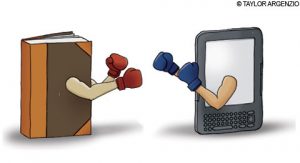
Some digital methods of doing things are completely beneficial, such as writing or drawing because you already have a “focus” or “idea.” On the other hand, with reading and doing academic research it can be distracting. Even though the internet gives easy access to a wealth of information, the overload can divert your attention. In an article, The Reading Brain in the Digital Age: The Science of Paper versus Screens, written by journalist Ferris Jabr, research shows that not only can reading on a screen cause you to be distracted, but also how it can be more arduous on your eyes and brain. Prolonged digital use (computers, phones,etc) puts strain on the eyes and in my case, causes my eyes to want to wander. Use of E-readers and technologies with even LCD screens can lead to problems, ranging from blurry vision to computer vision syndrome. (Reading paper screens. Jabr.) Additionally, articles read on the Internet may not be fully comprehensible due to ads, pop ups, difficult texts, and other distractions. Online reading may drastically affect a readers ability to think. Journalist Nicholas Carr acknowledges this, “And what the Net seems to be doing is chipping away my capacity for concentration and contemplation. My mind now expects to take in information the way the Net distributes it: in a swiftly moving stream of particles. Once I was a scuba diver in the sea of words. Now I zip along the surface like a guy on a Jet Ski.”(Is Google Making us Stupid? Carr). Carr is saying that although we are reading, we are not completely absorbing the information in the way we should. We unintentionally skim and read words without completely comprehending them since we are used to having the ease and practicality of the Internet.
Even though there are evident challenges with digital reading, people believe living in this digital age means that the what is viewed as plagiarism should be updated. In an article written by Susanne Murphy, she states that schools are losing their ability to have an influence in the outside world because there are many sources online and that plagiarism is an ideology that does not matter in modern day society. (Plagiarism Is Dead..Murphy). Though she is correct about the internet being a powerhouse for information, I disagree with her claim that schools are losing their ability to matter. In my opinion, schools should offer students a choice to do things either traditionally or digitally. This way they have a balance and can eventually decide which is more personally intelligible as a learning technique. In Paula La Farge’s article, she explores the challenges of digital technology and its effect on the reading brain, while giving insight on how to effectively change the way you read digitally in order to have more success. “The Internet’s flood of information, together with the distractions of social media, threaten to overwhelm the interior space of reading, stranding us in what the journalist Nicholas Carr has called “the shallows,” a frenzied flitting from one fact to the next.” (Qtd. by Paula La Farge). The Internet is indeed a flood of information that can easily overwhelm, but perhaps if used properly it can be an academically valid resource.
Personally, I have been introduced to new methods when it comes to doing academic work digitally. I have found that annotating and writing your understanding of each paragraph will gradually help form your perspective. I used to read hardcover and paperback books as most kids did growing up and because my father was a teacher he encouraged reading. This had an immense impact on me and reading became my favorite pastime. One year, I received a Kindle for Christmas and I instantly got hooked, not only did it have books, but it had the Internet. This was around the age when Facebook was something I used all the time. Not only were there many distractions, but also the simple fact that it didn’t feel nor look like a book. “People expect books to look, feel and even smell a certain way; when they do not, reading sometimes becomes less enjoyable or even unpleasant.” (Reading Paper Screens Jabr.) This was mostly likely the case for me. For example, the artistic cover was now just a digital image that would be swiped and forgotten. The cover, to me, is a part of the experience; a portal that gives a visual peek of the books world.

The traditional way of using paper and pencil will have is faults, but it is more useful and reliable especially when it comes to academic assimilation. Schools should let students choose which way they prefer and work better with on a personal level. Requiring students to use a specific style adds more limitations. Schools should offer programs which teach how to use the internet properly for academic research. The Internet is still young and until we learn to use it to its full potential, we must stick to what we know best, paper and pencil.
Reading at a young age every chance given
Reading at a young age every chance given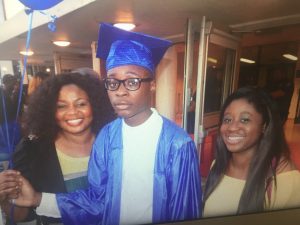
I would describe myself as someone who has common sense, is open minded, and observant. Im trying to teach myself to fashion design, though I’m into drawing generally, I realized my interest in combining different clothes. Ultimately, that resulted me in doing fashion sketches and looking into that as a career.
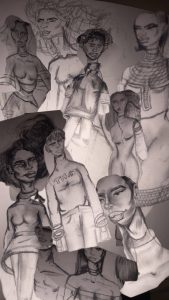
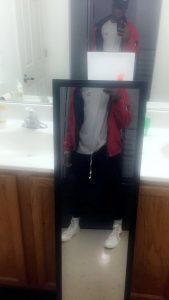
Having a preference for reading over other things such as watching tv, I feel, made me someone who is open to receiving knowledge because at that age I was reading for a hobby. I recall a literacy book that changed color every school year, which was vital in my literary foundation. When I reached 5th grade, I was still reading, but probably only every night.
However in 5th grade, I won a spelling bee, which was pretty important to me at the time. I had a scheduled dentist appointment, which I almost went to but changed my mind at the last minute. When I was one of two remaining, I spelled the word “gnat” wrong because I thought there was a k instead of a g. Then my peer spelled faucet wrong, and I spelled it right along with another word resulting me in winning. This was a special moment to me because I knew I read more than most of my classmate so I believed I had a chance of being one of the last people in the bee, but I ended up winning the honor, a dictionary, thesaurus and a bag of candy. Then my dad took me to dinner.
My parents, especially my father being a teacher at the time, always encouraged me to read and helped me with writing during the time I had to take a writing class. I had a teacher, whose class I did well in after struggling a little, and a reading teacher ,whose class wasn’t difficult at all. Reading included vocabulary, spelling, punctuation, and things like that, whereas writing included writing, writing, and more writing. The reading was much easier because it was something that I not only did frequently, but loved as well. The more books I read, the more vocabulary I used, and spelling and grammar came hand in hand with that. I was able to use these skills in not only my reading class, but also my writing class.

My favorite children’s writer is probably R.L Stine’s. His Fear series, along with his goosebumps books had a lasting effect on me. My love for mysteries, the human psyche, and thrillers, have all stemmed from reading R.L Stine, Caroline Cooney’s “Janie Series”, and other 80’s and 90’s books “fingerprints series” by Melissa Metz, that an older cousin gave to me (that had amazing cover art) my father brought from work as well as the scholastic book fairs that I started seeing less of as I got older. I remember overwhelming my dad to bring me specific books and I would have rather kept them than return them because I wanted the chance to read them over and over again.
The book showed below is a gem that I got for free on amazon kindle. It was a political kind of mystery book in which a fatal car accident is blamed on an individual with a lower status and it turns out theres an entire conspiracy behind it. I read this book in one night and I remember thinking about it for the next few weeks. Although I was completely satisfied with the conclusion of the book, it ended with a cliffhanger that I still think about.
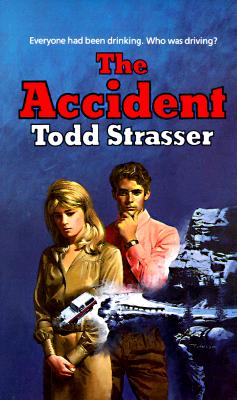
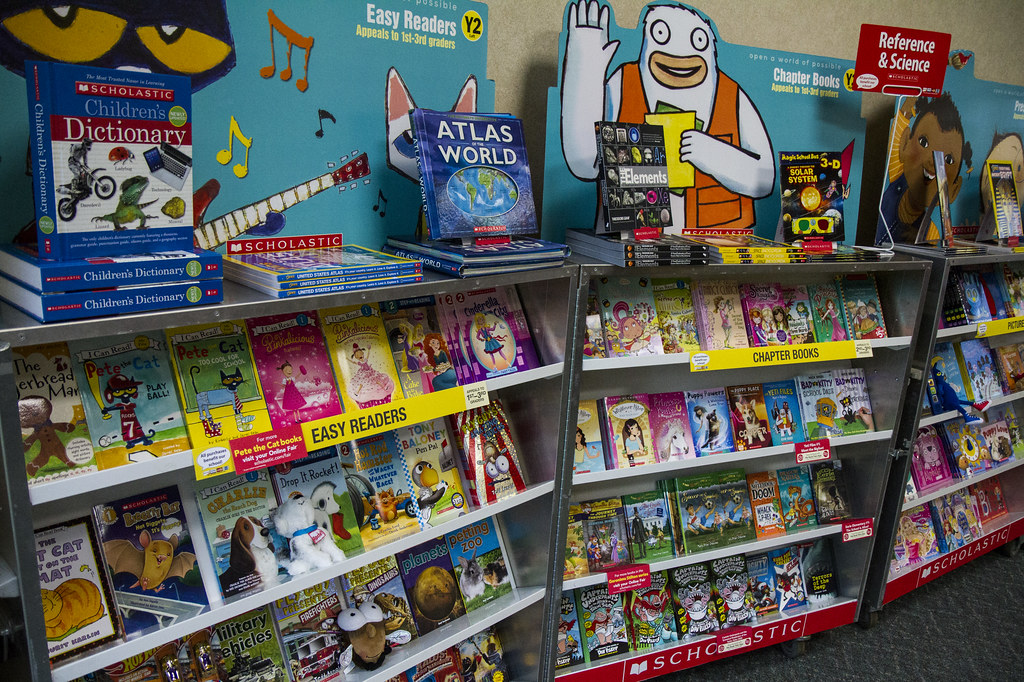
Currently, I’m reading 3 completely different books, The Bluest Eye, by Toni Morrison, which I have owned for most of my life, but have prolonged reading. You are a Badass: How to stop Doubting your greatness…,by Jen Sincero, and a book by George Pelecanos, that I don’t remember the name of. Lately, I recognize that my digital use has also kept me reading. If I’m watching a movie that I enjoy. I dive further into the story by reading interviews, for example the movie City Of God, had an intriguing history behind it, that I found out only through readings on the real story and even the actors who portrayed the people they were based on.Purdue OWL has always been a tool that teachers have stressed to use when citing or annotating; it is helpful, but I don’t use it because some of their examples are specific and I find that I would always try to model my sentence structure after theirs when starting my essays
Im not sure if writing will help me in the career that I’m planning for myself yet, however I am open to learn any skills that I may need.